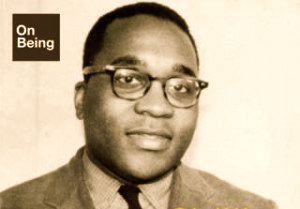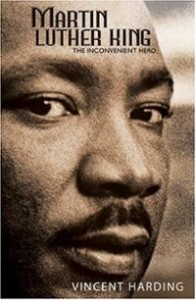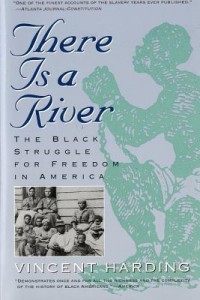Vincent Gordon Harding

Remembering Historian Vincent Harding, Who Drafted Dr. Martin Luther King’s Anti-Vietnam War Speech
We end today’s show remembering Vincent Harding, the historian, author and civil rights activist who died Monday at the age of 82. He was a friend and speechwriter for Dr. Martin Luther King Jr. and co-wrote King’s famous antiwar address, “Beyond Vietnam.” Speaking on Democracy Now! in 2008, Vincent Harding talked about the speech. “King saw the natural connection between what was happening to the poor in the U.S.A., why young men and women were rising up in anger, frustration, desperation, saw that action as deeply related to the attention that the country was paying to the devastation it was doing in Vietnam,” Harding said. “And so, King was actually trying to bring the country together to sense the relationship between its sickness at home to the sickness of its policy overseas.”
TRANSCRIPT: This is a rush transcript. Copy may not be in its final form.
AMY GOODMAN: We end today’s show remembering Vincent Harding, the historian, author and civil rights activist. He died Monday at the age of 82. He was a friend and speechwriter for Dr. Martin Luther King, and he wrote the draft for Dr. King’s famous antiwar address, “Beyond Vietnam.” Speaking on Democracy Now! in 2008, Vincent Harding talked about the speech.
DR. VINCENT HARDING: There was a great deal of struggle within the community around Martin about the speech—even more than about the speech, about what position King should take in relationship to what our country was doing in Vietnam and what our country seemed intending to do all over the world.
But it’s important to recognize that King saw these issues not simply as what we call foreign policy issues. King was most deeply a pastor, and King saw these issues in terms of what they were doing to the poorest, weakest, most vulnerable people in this country, as well as what they were doing to the poor of other countries, particularly, in this case, Vietnam. So King did not see himself as separating his attention from this country and turning it overseas. King saw the natural connection between what was happening to the poor in the U.S.A., why young men and women were rising up in anger, frustration, desperation, saw that action as deeply related to the attention that the country was paying to the devastation it was doing in Vietnam. And so, King was actually trying to bring the country together to sense the relationship between its sickness at home to the sickness of its policy overseas.
AMY GOODMAN: Vincent Harding, the historian, author, professor and civil rights activist, died Monday at the age of 82 in Colorado. He was a friend and a speechwriter for Dr. Martin Luther King, and he wrote the draft for Dr. King’s famous antiwar address that he gave at Riverside Church April 4th, 1967. Vince Harding was also professor emeritus of religion and social transformation at the Iliff School of Theology in Denver. We will link to all our broadcasts of interviews with Dr. Vince Harding.
 Vincent Gordon Harding (July 25, 1931 – May 19, 2014) was an African-American historian and a scholar of various topics with a focus on American religion and society. A social activist as well, he was perhaps best known for his work with and writings about Dr. Martin Luther King, Jr., whom Harding knew personally. Besides having authored numerous books such as There Is A River and Wade in the Water: The Wisdom of the Spirituals, he served as co-chairperson of the social unity group Veterans of Hope Project and as Professor of Religion and Social Transformation at Illiff School of Theology in Denver, Colorado.
Vincent Gordon Harding (July 25, 1931 – May 19, 2014) was an African-American historian and a scholar of various topics with a focus on American religion and society. A social activist as well, he was perhaps best known for his work with and writings about Dr. Martin Luther King, Jr., whom Harding knew personally. Besides having authored numerous books such as There Is A River and Wade in the Water: The Wisdom of the Spirituals, he served as co-chairperson of the social unity group Veterans of Hope Project and as Professor of Religion and Social Transformation at Illiff School of Theology in Denver, Colorado.
Education
Harding was born in Harlem, New York, and attended New York public schools, graduating from Morris High School in the Bronx in 1948. After finishing high school, he enrolled in the City College of New York, where he received a B.A. in History in 1952. The following year he graduated from Columbia University, where he earned an M.S. in Journalism. Harding served in the U.S. Army from 1953-1955. In 1956 he received an M.A. in History at the University of Chicago. In 1965 he received his Ph.D. in History from the University of Chicago, where he was advised by Martin E. Marty.
Career
 In 1960, Harding and his wife, Rosemarie Freeney Harding, moved to Atlanta, Georgia to participate in the Southern Freedom Movement (also known as the American civil rights movement) as representatives of the Mennonite Church. The Hardings co-founded Mennonite House, an interracial voluntary service center and Movement gathering place in Atlanta. The couple traveled throughout the South in the early 1960s working as reconcilers, counselors and participants in the Movement, assisting the anti-segregation campaigns of the Southern Christian Leadership Conference (SCLC), the Student Nonviolent Coordinating Committee (SNCC) and the Congress of Racial Equality (CORE). Vincent Harding occasionally drafted speeches for Martin Luther King, including King’s famous anti-Vietnam speech, “A Time to Break Silence” which King delivered on April 4, 1967 at Riverside Church in New York City, exactly a year before he was assassinated.
In 1960, Harding and his wife, Rosemarie Freeney Harding, moved to Atlanta, Georgia to participate in the Southern Freedom Movement (also known as the American civil rights movement) as representatives of the Mennonite Church. The Hardings co-founded Mennonite House, an interracial voluntary service center and Movement gathering place in Atlanta. The couple traveled throughout the South in the early 1960s working as reconcilers, counselors and participants in the Movement, assisting the anti-segregation campaigns of the Southern Christian Leadership Conference (SCLC), the Student Nonviolent Coordinating Committee (SNCC) and the Congress of Racial Equality (CORE). Vincent Harding occasionally drafted speeches for Martin Luther King, including King’s famous anti-Vietnam speech, “A Time to Break Silence” which King delivered on April 4, 1967 at Riverside Church in New York City, exactly a year before he was assassinated.
Harding taught at the University of Pennsylvania, Spelman College, Temple University, Swarthmore College, and Pendle Hill Quaker Center for Study and Contemplation. He was the first director of the Martin Luther King Jr. Memorial Center and of the Institute of the Black World, both located at Atlanta. He also became senior academic consultant for the PBS television series Eyes on the Prize.
Harding served as Chairperson of the Veterans of Hope Project: A Center for the Study of Religion and Democratic Renewal, located at the Iliff School of Theology in Denver, Colorado. Harding taught at Iliff as Professor of Religion and Social Transformation from 1981 to 2004.
Beliefs and Activism
 Harding was a devout Christian and believer in achieving racial and economic equality in the United States.
Harding was a devout Christian and believer in achieving racial and economic equality in the United States.
In January 2005, Harding remarked at the Christian liberal arts university Goshen College,
“There’s a lesson for us: If we lock up Martin Luther King, and make him unavailable for where we are now so we can keep ourselves comfortably distant from the realities he was trying to grapple with, we waste King. All of us are being called beyond those comfortable places where it’s easy to be Christian. That’s the key for the 21st century – to answer the voice within us, as it was within Martin, which says ‘do something for somebody.’ We can learn to play on locked pianos and to dream of worlds that do not yet exist.”
Writings
- Chapter 1 Widening the Circle: Experiments in Christian Discipleship
- African-American Christianity: Essays in History
- Martin Luther King: The Inconvenient Hero
- Hope and History: Why We Must Share the Story of the Movement
- We Must Keep Going: Martin Luther King and the Future of America
- There Is a River: The Black Struggle for Freedom in America
- Foreword to Wade in the Water: The Wisdom of the Spirituals, by Arthur C. Jones
- We Changed the World: African Americans, 1945-1970 (The Young Oxford History of African Americans, V. 9)
- A Certain Magnificence: Lyman Beecher and the Transformation of American Protestantism, 1775-1863 (Chicago Studies in the History of American Religion)
- Introduction to How Europe Underdeveloped Africa, by Walter Rodney
- Foreword to Jesus and the Disinherited, by Howard Thurman (Beacon Press, 1996).
 There Is a River: The Black Struggle for Freedom in America by Vincent Harding
There Is a River: The Black Struggle for Freedom in America by Vincent Harding
This is the story of the violation of Black Africa and the bondage of its peoples in another land. Harding resurrects forgotten heroes and traces the struggle of their descendants to keep the spirit and dreams of an uprooted people alive.

